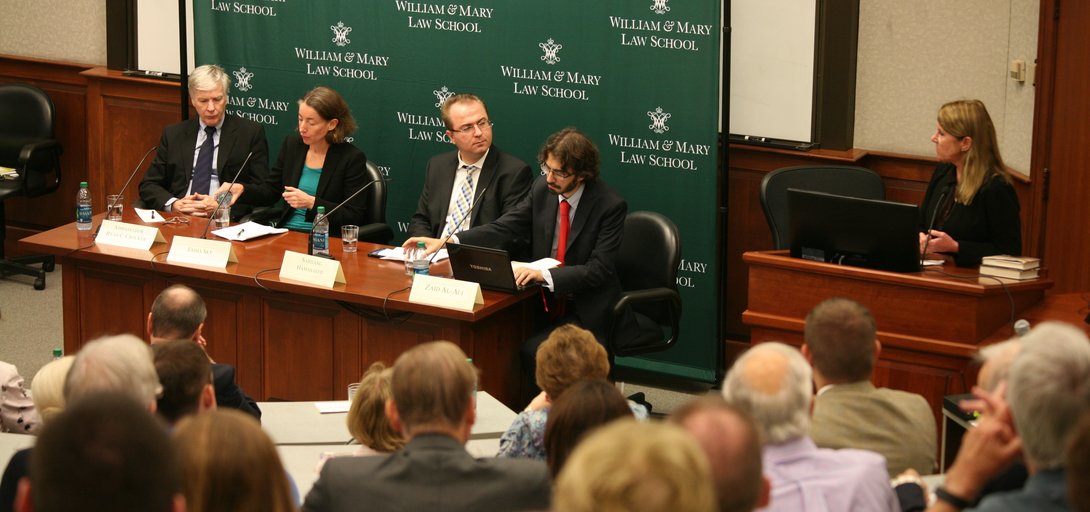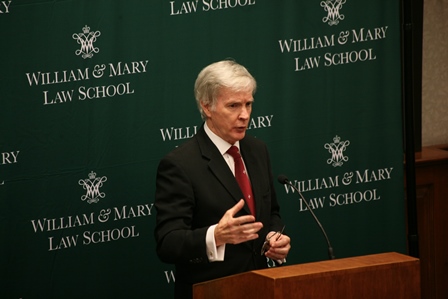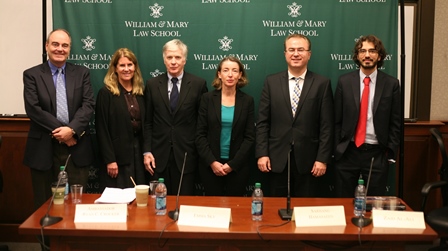The Future of Iraq Symposium

By Abby Riley and Meghan Phillip
On October 8 and 9, 2015, William & Mary’s Center for Comparative Legal Studies and Post-Conflict Peacebuilding, the Reves Center for International Studies, and the Comparative Legal Student Scholars hosted The Future of Iraq, a symposium exploring possible scenarios for Iraq’s future in light of its past and present. The symposium boasted four experts: Ambassador Ryan C. Crocker, Emma Sky, Sarhang Hamasaeed, and Zaid Al-Ali and was attended by a standing room only crowd.
Ambassador Crocker, who serves as the 2016 Kraemer Middle East Distinguished Scholar in Residence, opened the symposium on October 8 with a keynote address titled Iraq and America: The Day After Tomorrow. Over the course of 37 years, Ambassador Crocker gained extensive experience working in the Middle East and served as ambassador to Afghanistan, Iraq, Kuwait, Lebanon, Pakistan, and Syria. His tenure in Iraq coincided with the transition from the Bush to the Obama administrations, when President Bush’s “surge” of troops was quickly replaced by President Obama’s plan to end the war by withdrawing all American troops by 2011. Ambassador Crocker has been honored with a number of awards, including the Presidential Medal of Freedom, and he currently serves as the Dean and Executive Director of the George Bush School of Government and Public Service at Texas A&M University. His extensive experience in the Middle East allowed him to analyze historical events that set the stage for current events in Iraq, beginning with the dawn of Islam and extending through modern times.
“Be careful what you get into, and be at least as careful what you get out of. It’s a hard truth – you don’t end wars by withdrawing your forces. You may simply be leaving the battlefield to your enemies,” Ambassador Crocker said, acknowledging that ISIS has filled a power vacuum left in the region when the US withdrew. He cautioned the audience that in a few months we are likely to feel nostalgia for the current dire situation in Iraq and Syria and ended his keynote address advocating for diplomatic – as opposed to military – strategies to remedy the current crisis in the Middle East.

The next day, Ambassador Crocker joined three other experts for a roundtable discussion on Iraq: Yesterday, Today and Tomorrow moderated by Professor Christie S. Warren.
Emma Sky, a colleague of Ambassador Crocker’s when he worked in Iraq, is currently a Senior Fellow at Yale’s Jackson Institute for Global Affairs. While working in Iraq and Afghanistan between 2003 and 2010, Sky served as advisor to the Commanding General of US Forces; as advisor to the Commander of NATO’s International Security Assistance Force in Afghanistan; as advisor to the US Security Coordinator for the Middle East Peace Process; and as Governorate Coordinator of Kirkuk for the Coalition Provisional Authority. Her book, The Unraveling: High Hopes and Missed Opportunities in Iraq, was recently short-listed for the 2015 Samuel Johnson Prize for Non-Fiction.
While working with Ambassador Crocker in Iraq, Sky stated she tried to adopt an optimistic outlook regarding the country’s future and said that the Iraqi human potential should not be underestimated. Even so, she acknowledged the complexities facing the country and region and agreed with Ambassador Crocker and other panelists that the notion that Iraq’s problems could be solved merely by partitioning the state into independent Kurdistan, Shiastan, and Sunnistan was “nothing more than a fairytale.”
The third expert panelist, Sarhang Hamasaeed, is Senior Program Officer for Middle East and North Africa Programs at the U.S. Institute of Peace. Between 2008 and 2009, he served as a Deputy Director General at the Council of Ministers of the Kurdistan Regional Government of Iraq, where he worked to manage strategic government modernization initiatives through information technology. Between 2003 and 2004 he also served as a Program Manager for the Research Triangle Institute International, where he managed civic engagement and local democratic governance programs in Iraq. While these experiences alone would have given him valuable perspectives, his insights have also been shaped by his personal history. Of Kurdish ancestry, Hamasaeed spent the first three decades of his life in Iraq until he was displaced and forced to seek asylum in the US. When describing the fear and paranoia of Iraqi people under Saddam’s totalitarian regime, he noted that as a student, whenever one could not remember an answer on a test, he or she would simply write “Saddam Hussein.” Even if this answer was completely irrelevant, teachers were forced to give students full credit, since “Saddam Hussein could never be a wrong answer.”
Hamasaeed introduced one of the day’s most interesting discussion points. He quoted Iraqi King Faisal, who in 1933 stated, “In Iraq, there is still no Iraqi people, but unimaginable masses of human beings devoid of any patriotic ideal . . . connected by no common tie, giving ear to evil, prone to anarchy, and perpetually ready to rise against any government whatsoever.” With this quote, he underlined the importance of history in current debates and stated that arguments that Iraq is an artificial country whose leaders have difficulty uniting its ethnically and religiously diverse people have a long history. Although Hamasaeed admitted that he is not as pessimistic as King Faisal, he agreed that in light of Iraq’s fragmentation and the Islamic State insurgency it does appear that a unified Iraq is not guaranteed in the future.
The final panelist, Zaid Al-Ali, provided a fiery and somewhat opposite perspective. Al-Ali, who currently holds a position as Visiting Lecturer in Comparative Constitutional Law at Princeton's Program in Law and Public Affairs, is the author of The Struggle for Iraq’s Future: How Corruption, Incompetence and Sectarianism Have Undermined Democracy. He spoke about his experiences as a legal advisor for the UN Assistance Mission for Iraq’s Office of Constitutional Support, which was mandated to provide advice to the Iraqi constitutional drafting committee.
Al-Ali’s background also informed his perspectives. Born in Madrid in 1977, his father was Iraq’s ambassador to the United Nations until 1980, when he resigned in protest over the start of the Iran-Iraq war. His resignation caused his family to live in exile until the fall of Saddam Hussein’s regime in 2003; as a result, Al-Ali grew up in New York and London among many of the exiles who would later become Iraq’s new governing elite following the invasion by the Coalition. His impression of this group was not favorable, and he placed much of the blame for Iraq’s current difficulties on the fact that the Coalition backed their ambitious ascents to power and their incompetent governance strategies. In contrast to Hamasaeed’s interpretation of King Faisal’s assessment, Al-Ali argued that the Iraqi people do have a unique identity that transcends tribal, ethnic, and religious roots. He agreed with Sky that dividing the country into three separate regions is not a viable or desirable solution and stated that the international community and foreign governments should stop trying to control outcomes in Iraq; Iraqi people should be allowed to assume ownership of their own solutions.
The symposium was supported by generous financial assistance from the Reves Center for International Studies, the Kraemer Middle East Distinguished Scholar in Residence Program, the Colonial Williamsburg Foundation and Lois Critchfield.
